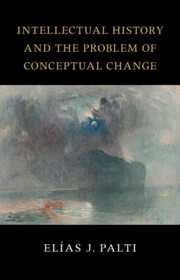Book contents
- Intellectual History and the Problem of Conceptual Change
- The Seeley Lectures
- Intellectual History and the Problem of Conceptual Change
- Copyright page
- Contents
- Preface
- Acknowledgments
- Introduction
- Chapter 1 Pocock, Skinner, and the “Historiographical Revolution”
- Chapter 2 The Republican Genealogy and the Normative Temptation
- Chapter 3 The Problem of Conceptual Change
- Chapter 4 Conceptual History
- Chapter 5 Koselleck’s Begriffsgeschichte
- Chapter 6 Hans Blumenberg and the Theory of Nonconceptuality
- Chapter 7 From Structuralism to Poststructuralism
- Chapter 8 Foucault’s Archaeology of Knowledge
- Chapter 9 The Archaeological Project and the Ignored Epistemic Mutation
- Chapter 10 Behind the Structures and the Subject
- Conclusion
- Epilogue
- Quoted Bibliography
- Index
Chapter 9 - The Archaeological Project and the Ignored Epistemic Mutation
Published online by Cambridge University Press: 02 May 2024
- Intellectual History and the Problem of Conceptual Change
- The Seeley Lectures
- Intellectual History and the Problem of Conceptual Change
- Copyright page
- Contents
- Preface
- Acknowledgments
- Introduction
- Chapter 1 Pocock, Skinner, and the “Historiographical Revolution”
- Chapter 2 The Republican Genealogy and the Normative Temptation
- Chapter 3 The Problem of Conceptual Change
- Chapter 4 Conceptual History
- Chapter 5 Koselleck’s Begriffsgeschichte
- Chapter 6 Hans Blumenberg and the Theory of Nonconceptuality
- Chapter 7 From Structuralism to Poststructuralism
- Chapter 8 Foucault’s Archaeology of Knowledge
- Chapter 9 The Archaeological Project and the Ignored Epistemic Mutation
- Chapter 10 Behind the Structures and the Subject
- Conclusion
- Epilogue
- Quoted Bibliography
- Index
Summary
Chapter 9 analyzes Foucault’s concrete proposal of an archaeology of knowledge. It studies his idea of the different epistemai or regimes of knowledge that appeared in the West in the period that spans from the seventeenth century to the twentieth century. The first is the one he calls the “Age of Representation,” which was associated to the “Science of Order.” It discusses how the development of the modern scientific project entailed a triple interdiction: on the idea of end, origin, and change. As we subsequently will see, the need to overcome this limit produced the break of the Age of Representation and the emergence, at the beginning of the nineteenth century, a new episteme. For Foucault, it was only at this point that “modern subject” appeared. Time then became an immanent dimension in beings. The aim here is showing why the archaeological perspective provides the bases for a much more accurate picture of the different conceptual formations whih appeared historically. And also how each of them entailed a particular idea of temporality and of the concept of the subject.
Keywords
- Type
- Chapter
- Information
- Intellectual History and the Problem of Conceptual Change , pp. 195 - 209Publisher: Cambridge University PressPrint publication year: 2024

